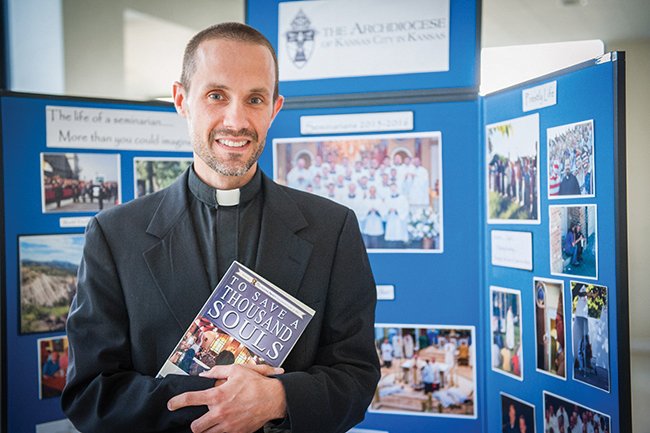
Father Scott Wallisch is the archdiocesan vocations director. You can email him at: frscott@archkck.org
by Father Scott Wallisch
In the last 20 years, our archdiocese has been blessed with a slow, yet steady overall increase in the number of seminarians.
This fall, we have 29 men studying in six different seminaries. With a substantial number of seminarians and a diversity of formational settings, it is important to provide opportunities for Archbishop Joseph F. Naumann to get to know his future priests and for these men to get to know each other.
The best of those opportunities is our annual pilgrimage. At the beginning of August, I joined the archbishop and most of our seminarians on a pilgrimage to New Orleans (see the Aug. 28 issue of The Leaven). We learned some history of the early church in the United States, visited the Shrine of Our Lady of Succor (who played an intercessory role in the Battle of 1812), prayed at the Shrine of Blessed Francis Xavier Seelos (who died ministering to yellow fever victims), celebrated Mass in the local cathedral and toured an old plantation with slave quarters.
Besides creating time for fraternity, pilgrimages provide pilgrims physical journeys that assist them on their spiritual journeys. Pilgrimages replace our ordinary routines with unfamiliar, sometimes uncomfortable settings, in order to keep us from complacency and attachment to this world. They redirect our minds to our heavenly pilgrimage.
Although ours was not a terribly taxing pilgrimage, two 16-hour bus rides, long walks in the muggy heat of Louisiana and a week putting up with me gave seminarians many things to sacrifice. In prayer and Mass, they offered up their little sufferings for specific men in our archdiocese who are discerning the priesthood.
This brings me to the point of my column. Our vocations are our pilgrim paths to heaven. As part of my ongoing series of columns to help folks in our archdiocese discern God’s call in their lives, I today propose that pilgrimages can help discern our path.
When we allow ourselves to get out of our normal surroundings and physically move ourselves toward places of religious significance, we create a time for Our Lord. We learn about the ways we are attached to usual comforts and ponder whether we can detach from the world in a life of radical service to the church.
Perhaps most importantly, we experience prayer at a deeper level, where God reveals more of his plan for our lives.
So, I encourage those seeking God’s will to try a pilgrimage, whether to foreign holy cities, domestic shrines or nearby convents and monasteries.
Pilgrimages do not guarantee complete clarity about our futures. When we engage them with open hearts, though, these spiritual journeys can guarantee an encounter with God, who is the ultimate destination of all pilgrimages and of all vocations.

